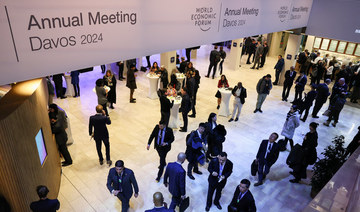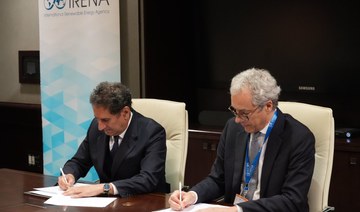ABU DHABI: Energy Minister Khalid Al-Falih on Thursday suggested that production cuts agreed to by members of the Organization of Petroleum Exporting Countries (OPEC) and countries outside of the group may need to continue to help shore up crude oil prices.
The comments come as the price per barrel stand above $50 and increases in US shale oil production threaten to keep them low.
“There is an initial agreement but it has not been communicated to all the countries yet that we might be forced to extend in order to reach our goal,” Al-Falih said in a speech at an oil conference in Abu Dhabi.
OPEC agreed in late November to cut its production by 1.2 million barrels a day for six months, its first cut since 2008. Nearly a dozen other countries including Russia pledged in December to cut an additional 558,000 barrels a day.
OPEC is keen that non-member producers play their promised part in supporting the group’s efforts to lift prices, which have recovered to $53 a barrel from lows last year below $30.
OPEC and non-OPEC meet on May 25 to discuss extending the curbs that total 1.8 million barrels daily, two-thirds of that from OPEC.
OPEC sources said an internal assessment was that if they failed to extend the agreement, oil could slide back to $30-$40 a barrel.
Significant wild cards remain, however. President Donald Trump has pledged to free up more oil drilling in the US. The global economy remains weak as well. Meanwhile, shale oil production has started growing again in the US while Iran rushes to produce as much as it can to make up for years of economic sanctions it suffered over its contested nuclear program.
Talking about shale, UAE Energy Minister Suhail Al-Mazroui said producers involved in the cut made the decision “because we care about the balance in the market.”
He said: “This sacrifice cannot be taken as a sacrifice where someone else can benefit 100 percent.”
Kuwait’s Oil Minister Essam Al-Marzouq said he expected the output cut agreement to be extended. “Russia is on board preliminarily ... Compliance from Russia is very good,” Al-Marzouq said.
OPEC Secretary-General Mohammed Barkindo, noting that Al-Marzouq chairs a committee that measures compliance with the cuts, said: “It is significant that the Kuwaiti minister has come out in public and said this.”
Inventories still high
Al-Falih said his main concern was to reduce global oil inventories, calling that “the main indicator for the success of the initiative.”
While inventories held at sea and in producer countries have dropped, they remain stubbornly high in consumer regions, particularly in Asia and the US.
Oil prices were largely flat on Thursday. Brent futures were at $52.93 barrel at 1345 GMT, unchanged from their last close. US crude futures were down 9 cents at $50.50 a barrel.
Both benchmarks had traded more than 50 cents higher earlier in the day, but gains eased at the start of US trading hours.
“The US market perhaps does not believe in the oil market balance that OPEC would have us believe,” said Hans van Cleef, senior energy economist with ABN AMRO.
The International Energy Agency said last week that inventories in industrialized countries were still 10 percent above the five-year average, a key gauge for OPEC.
OPEC seems to be encouraged by the contribution of non-OPEC producers to the output cuts.
Al-Marzouq said there was a “noticeable increase in compliance from non-OPEC.” Joint compliance among OPEC and non-OPEC in March was above 90 percent, he said.
Russia has not yet publicly committed to prolonging its curbs, although Energy Minister Alexander Novak said this month that Moscow would start consultations with producing companies about the possibility of doing so.
Al-Marzouq said another African nation, which he did not identify, had expressed interest in joining the 24-country effort.
One hold-out for an extended deal may be Iraq. Baghdad might seek to be exempt and ask to boost its own output, said the leader of the nation’s ruling coalition, Ammar Al-Hakim.
Speaking in Cairo, Al-Hakim cautioned that Baghdad could ask to be exempted from taking part in the supply curbs as the OPEC member country needed its oil income to fight Daesh.
“Given these sensitive circumstances, it is the right of Iraq to hope for an exemption by the other OPEC member states and have an opportunity to increase its production,” Al-Hakim, an influential cleric, said in an interview this week.
“But we are with the principle of reducing the overall OPEC supply to lift prices.”
Iran does not look likely to become an obstacle. The current deal granted Tehran permission to lift output, hit by Western sanctions that ended just over a year ago.
“Iran is not an issue. We know they cannot raise their production much more,” an OPEC source said.
Al-Falih: Oil output cuts may need to continue
Al-Falih: Oil output cuts may need to continue
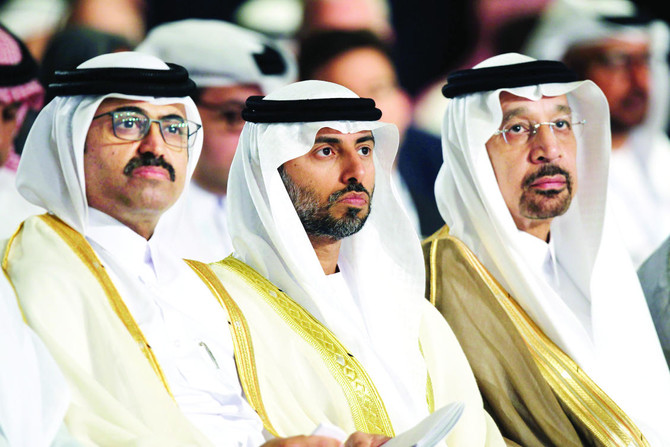
Pakistan hopes to get new IMF loan by early July, says finance minister
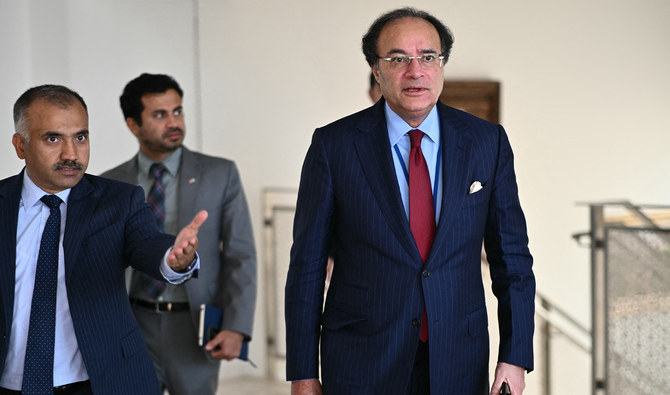
- Pakistan’s current $3 billion financial arrangement with IMF expires in late April
- Islamabad is seeking “bigger,” long-term loan to ensure macroeconomic stability
Pakistan is hoping to reach a staff-level agreement with the International Monetary Fund by June or early July, its finance minister said on Tuesday.
The country’s current $3 billion arrangement with the fund runs out in late-April, which it secured last summer to avert a sovereign default.
Islamabad is seeking a long-term bigger loan to help bring permanence to macroeconomic stability as well as an umbrella under which the country can execute structural reforms.
“We are still hoping that we get a staff-level agreement by June or early July,” Finance Minister Muhammad Aurangzeb told a conference in Islamabad.
He returned from Washington last week after leading a team to attend the IMF and World Bank’s spring meetings. “We had very good discussions in Washington,” he said.
He said he did not know at this stage the volume and tenure of the longer program.
Riyadh prepares to host special meeting of World Economic Forum

- The aim of the gathering is to find solutions to global challenges relating to humanitarian issues, the climate and the economy
RIYADH: Final preparations are taking place this week in the Saudi capital, Riyadh, for a special meeting of the World Economic Forum in the city on April 28 and 29.
Heads of state and senior executives from the public and private sectors are expected to be among the participants, who will discuss a range of global economic issues and developments under the theme “Global Collaboration, Growth and Energy for Development.”
The aim of the meeting is to find solutions to a host of global challenges relating to humanitarian issues, the climate and the economy. On the sidelines of the main event, the Kingdom will host exhibitions and other events to highlight the latest developments and trends in areas such as sustainability, innovation and culture.
The selection of Riyadh as host of the special meeting reflects the extensive partnership between Saudi Arabia and the WEF, officials said.
It builds upon the Kingdom’s active participation and contributions to the WEF’s Annual Meetings in Davos.
The agenda is designed to rekindle the spirit of cooperation and collaboration with various panel discussions, workshops, and networking opportunities. It represents a significant gathering of global leaders and experts dedicated to forging a path toward a more resilient, sustainable, and equitable world.
ACWA Power inks deal to drive renewable energy development in Azerbaijan
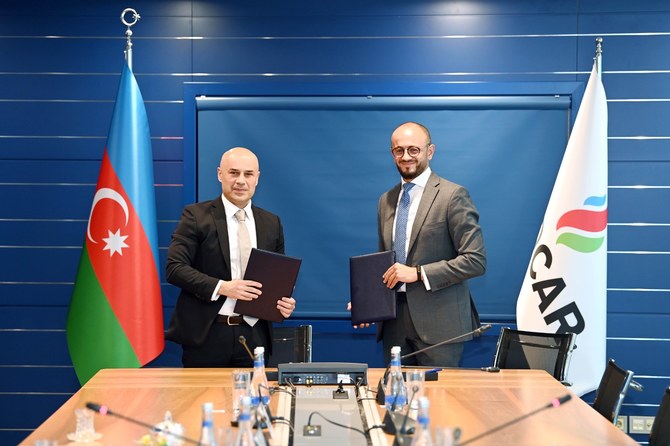
RIYADH: Saudi energy giant ACWA Power is signing a new agreement to accelerate the development of renewable projects in Azerbaijan.
The private water desalination company, known for its extensive green hydrogen storage capacity, announced it has now finalized an agreement with SOCAR, the State Oil Company of the Azerbaijan Republic.
This development follows an initial cooperation understanding signed in February 2023.
This deal focuses on the joint evaluation of the “Low-Carbon/Green Fertilizer” project, in which the two bodies will collaborate on assessing the production of green hydrogen to support the decarbonization of SOCAR downstream assets.
Marco Arcelli, CEO of ACWA Power, said in a statement, “I am proud to announce our collaboration with SOCAR to ignite a new era of renewable energy development in Azerbaijan. With our shared vision and commitment to sustainability, this partnership will not only drive innovation but also pave the way for a cleaner and brighter future for this country.”
The primary directive of the agreement will be to enhance SOCAR’s carbamide fertilizer facility, striving toward more value-added low-carbon products.
As part of the project, SOCAR and ACWA Power will conduct feasibility studies to assess the potential production and sale of green fertilizers, aligning with Azerbaijan’s vision of achieving a clean environment.
ACWA Power will take a role in driving the project’s renewable energy and green hydrogen production aspects, bringing their expertise to bear on this initiative.
For his part, Anar Mammadov, vice president of SOCAR, said, “Azerbaijan is committed to building a sustainable future, and our partnership with ACWA Power underscores our shared dedication to driving renewable energy development in the region. Together, we will work towards realizing our vision of a cleaner, greener Azerbaijan.”
He added: “The cooperation with ACWA Power represents a significant step forward in Azerbaijan’s transition towards a low-carbon economy and underscores the commitment of both organizations to sustainable development practices.”
Preceding this announcement, the two nations posed their intent to collaborate on renewables as Saudi Arabia’s Minister of Energy Prince Abdulaziz bin Salman met with Azerbaijan’s Minister of Environment and Natural Resources Mukhtar Babayev in March.
During the meeting, the counterparts discussed opportunities for work and cooperation between their two countries in the field of climate change.
They also talked about joint efforts to achieve the goals of the UN Framework Convention on Climate Change and the Paris Agreement, the Kingdom’s ministry said in a statement at the time.
Closing Bell: TASI edges down to close at 12,509 points
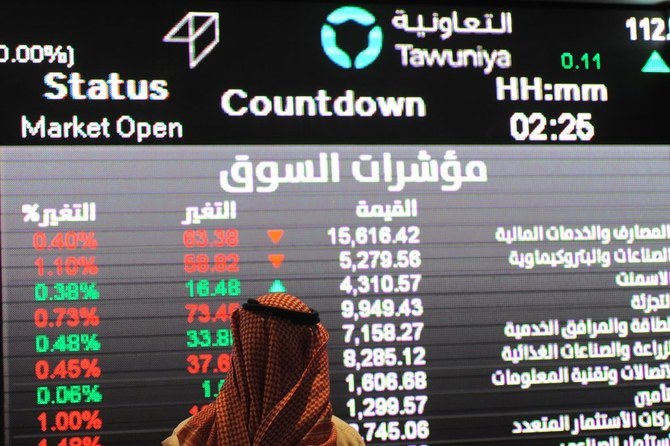
RIYADH: Saudi Arabia’s Tadawul All Share Index closed at 12,508.93 points on Monday, losing 9.29 points or 0.07 percent.
The parallel market, Nomu, also shed 343.96 points or 1.28 percent to end the day’s trading at 26,596.22.
Concurrently, the MSCI Tadawul 30 Index fell 3.95 points or 0.25 percent to finish at 1,567.16.
The main index posted a trading value of SR8.8 billion ($2.3 billion), with 74 stocks advancing and 148 declining. On the other hand, Nomu reported a trade volume of SR37.7 million.
Al-Rajhi Company for Cooperative Insurance was the top performer on TASI as its share price surged 9.93 percent to SR126.20. LIVA Insurance Co. followed next with its share price jumping 9.92 percent to close at SR21.50.
Gulf General Cooperative Insurance Co. also performed well, climbing 9.16 percent to SR16.44. Raydan Food Co. and Fitaihi Holding Group increased 8.14 and 8.11 percent to SR28.55 and SR4.40, respectively.
Conversely, Saudi Cable Co. recorded the most significant dip, declining 4.94 percent to SR75.
Alkhaleej Training and Education Co. and Ash-Sharqiyah Development Co. also experienced setbacks, with their shares dropping to SR31.50 and SR23.40, reflecting declines of 4.83 and 4.10 percent, respectively.
Nomu’s top performer was Dar Almarkabah for Renting Cars Co., which saw a 9.73 percent jump to SR44. Mayar Holding Co. and Alqemam for Computer Systems Co. also recorded notable gains, with their shares closing at SR4.27 and SR89.80, marking an increase of 7.02 and 5.03 percent, respectively. Arabian International Healthcare Holding Co. and Foods Gate Trading Co. also fared well.
On Nomu, Raoom Trading Co. was the worst performer, declining by 7.28 percent to SR135. Other underperformers included Natural Gas Distribution Co. and National Environmental Recycling Co., whose share prices dropped 5.58 percent and 5.23 percent to SR42.30 and SR12.32, respectively.
Watani Iron Steel Co. and Future Care Trading Co. declined during the day to settle at SR2.81 and SR8.70, respectively.
Saudi Aramco in talks to acquire 10% stake in China’s Hengli Petrochemical
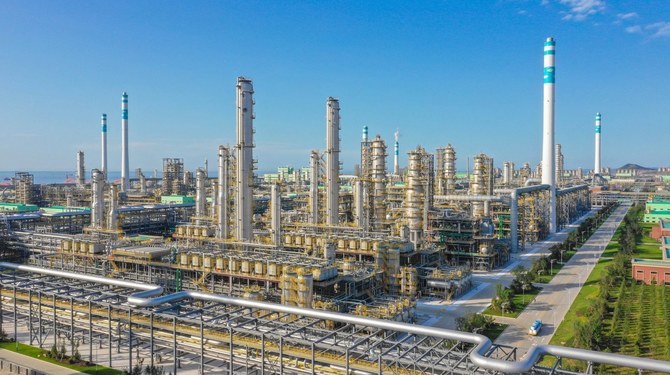
RIYADH: Energy giant Saudi Aramco held talks with Chinese Hengli Group Co. to acquire a 10 percent stake in its subsidiary, subject to due diligence and required regulatory clearances.
Aramco and Hengli Petrochemical Co. signed a memorandum of understanding for the proposed deal. The agreement supports the former’s strategy to increase its presence in key downstream markets, enhance its liquids-to-chemicals initiative, and ensure long-term crude oil supply agreements.
Last year, Aramco signed two multibillion-dollar agreements for liquids to chemicals investments in China.
In March 2023, a deal was signed between China’s Norinco Group and Panjin Xincheng Industrial Group to establish a joint venture to build a refinery and petrochemical complex in China’s Liaoning province. The initiative cost stands at approximately $12 billion.
The second agreement, signed in July, is an acquisition of a 10 percent stake in China-based firm Rongsheng Petrochemical Co. for $3.4 billion.
“This MoU supports our efforts to grow our global downstream footprint. We continue to explore new opportunities in important markets as we seek to progress in our liquids-to-chemicals strategy,” Mohammed Al-Qahtani, Aramco’s downstream president, said in a press release.
He continued: “We look forward to forging new partnerships and are excited by the prospect of expanding our presence in the important Chinese market.”
Hengli Petrochemical, a controlled subsidiary of Hengli Group, owns and operates a 400,000-barrel-per-day refinery and integrated chemicals complex in Liaoning province, and several plants and production facilities in Jiangsu and Guangdong provinces.
Speaking at a development forum held in March 2023 in Beijing, Amin Nasser, president and CEO of Aramco, highlighted substantial opportunities for cooperation between Saudi Aramco and Chinese partners in sectors aimed at reducing emissions.
“China has distinct strengths in renewables and critical materials, while Aramco and Saudi Arabia have a clear interest in solar, wind, hydrogen, and electrofuels. These areas have great long-term potential, and combining our strengths could match our ambitions,” he noted.
Saudi Arabia and China are working together to strengthen their already well-established strategic ties.
In September, the Kingdom’s minister of industry and mineral resources held meetings with key Chinese officials in Beijing. Bandar Alkhorayef also toured various companies and factories in different Chinese cities as part of his trip.
He held talks with China’s Vice Minister of Commerce Wang Shouwen, during which they discussed ways to boost economic collaboration and trade ties, the Saudi Press Agency reported.
The top officials also discussed investment opportunities in several economic sectors, including mining. At the time, the Saudi minister highlighted the Kingdom’s progress in the field of industries and mining.



